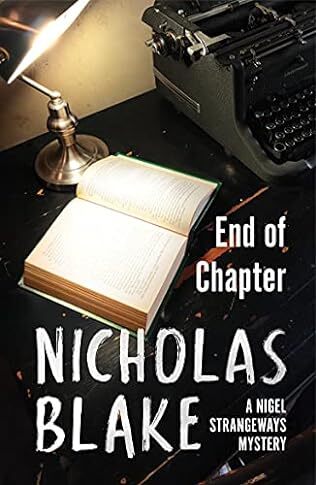End Of Chapter

A review of End of Chapter by Nicholas Blake – 240608
Nicholas Blake, the alter ego of the poet Cecil Day Lewis, is one of my favourite crime fiction but by his exalted standards End of Chapter, the twelfth in his Nigel Strangeways series and originally published in 1957, is rather disappointing. Part of the trouble for me is that the plot revolves around a rather recherché incident which I found hard to get excited about.
Wenham & Geraldine is an old established publishing firm and is about to bring out a volume of reminiscences by General Thoresby. There are a couple of passages, one at the end of a chapter, which the partners have asked to be deleted and with much reluctance the General has agreed. However, at some point between the final proof and the print run the libelous passages have been reinstated. Nigel Strangeways has been called in to investigate and protect the firm’s reputation.
There are a number of suspects, the General himself although he is quickly ruled out, Stephen Protheroe, a poet, he firm’s reader and the last person known to have handled the manuscript before it went to the printers, Mr Bates, the Production Manager who has rather brusquely been sent into early retirement, Millicent Miles, a romantic novelist who has installed herself in the company’s offices in an attempt to revive her career with her own autobiography, or Bruce Ryle, the circulation manager. Could it even have been one of the partners, but why would they want to sabotage their own firm?
As Strangeways begins his investigations, he soon discovers the tensions running through the firm, particularly the strained relationship between Protheroe and Millicent Miles, leading him to dig deeper into their past. Matters are spiced up when Millicent is found in the office on the Monday morning with her throat cut. The murder must have happened around leaving time on Friday evening.
Blake shows his inventiveness by describing the murder from the murderer’s point of view, not only introducing an unusual and fascinating perspective to the crime but also providing the reader with a mental checklist of how accurately Strangeways reconstructs the crime and the pointers and clues he uses to get there. For me this was the highlight of the book and, once more, text is substituted from the end of a chapter.
The book also revolves around two lost sons, one who was killed in tragic circumstances and the other, Cyprian Gleed, very much alive but a ne’er do well who drifts through life trying to sponge off his mother, Millicent Miles. The sons provide much of the motivational backdrop to the crime.
Millicent is depicted as femme fatale, with a viciously streak who enjoy provoking Protheroe and has Ryle under her spell. As Strangeways suspects, there is a tangled web of connections between her and Protheroe but there is also a dark and unpleasant secret linking Millicent with one of the partners, which explains their tolerance of her presence in the office.
Using a reconstruction of the murder, with his flame, Clare Massinger playing the role of the victim, Strangeways teases out the murderer who evades justice only to make an appointment with an oncoming steam train.
The story seemed rather too bitty for me and there were a number of loose ends, not least why Gleed try to kill Strangeways. The moral is never to leave your sinus spray lying around. As a poet, though, Blake is attuned to power of the Muse, its cathartic properties in times of stress and despair and its ability to suck out every ounce of creativity until there is nothing left. His psychological perspective on the fate of the poet is acute. There are some really fine passages in the book but the plot itself did not really engage. Perhaps unsurprisingly, P D James rewrote the book as Original Sin (1994), using the same setting, murder, and motive. I will; look that up sometime.



